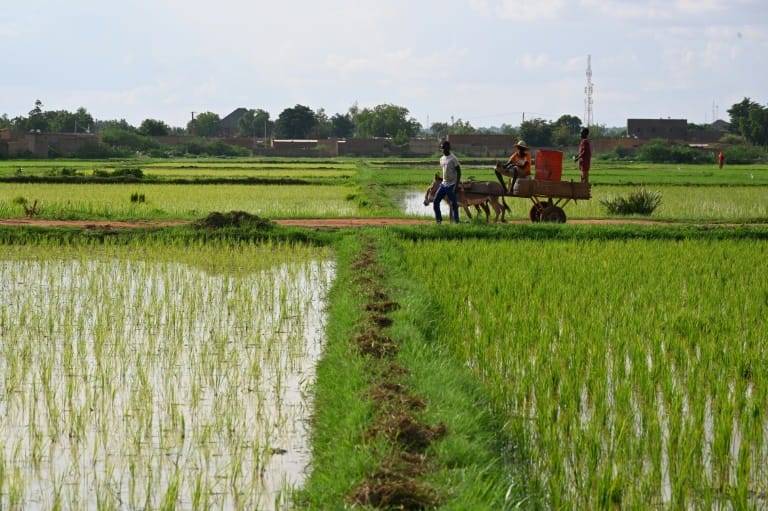Main Points In Hindi (मुख्य बातें – हिंदी में)
-
खाद्य निर्यात पर प्रतिबंध: नाइजर के सैन्य अधिकारियों ने स्थानीय आपूर्ति की सुरक्षा के लिए चावल, अनाज और अन्य खाद्य उत्पादों के निर्यात पर प्रतिबंध लगा दिया है, जबकि यह प्रतिबंध पड़ोसी देशों माली और बुर्किना फासो पर लागू नहीं है।
-
उच्च मुद्रास्फीति: साहेल राष्ट्र में खाद्य पदार्थों पर उच्च मुद्रास्फीति का सामना किया जा रहा है, जिसमें लोबिया, बाजरा, ज्वार और मक्का जैसी वस्तुएं शामिल हैं।
-
प्रतिबंधों का उल्लंघन: प्रतिबंधों के उल्लंघन पर सजा में शिपमेंट की जब्ती और आपराधिक दंड शामिल होंगे।
-
बाढ़ और कृषि उत्पादन: नाइजर में भारी बाढ़ आई है, जिससे 1.5 लाख लोग विस्थापित हुए हैं और 339 लोगों की मौत हुई है। हालांकि, कृषि मंत्रालय ने "अच्छी कृषि उपज" की उम्मीद जताई है।
- सीमेंट की कीमत में कमी: बाढ़ से प्रभावित लोगों की मदद के लिए नियामी में अधिकारियों ने सीमेंट की कीमत में 35 प्रतिशत की कटौती की घोषणा की है।
Main Points In English(मुख्य बातें – अंग्रेज़ी में)
Here are the main points from the provided text:
-
Export Ban: Niger’s military government has imposed an export ban on rice, grains, and other food products to all countries, excluding neighboring Burkina Faso and Mali, to ensure local supply security.
-
High Inflation: The Sahel region is facing high inflation on certain food items, with the ban affecting products like beans, millet, sorghum, and corn, in addition to rice.
-
Justification for Measures: Military leader Abdourahamane Tiani stated that the measures were taken to protect the internal market supply and make essential consumer goods more accessible.
-
Consequences of Violation: Violators of the export ban may face penalties, including shipment confiscation and criminal charges.
- Impact of Natural Disasters: Heavy rainfall has caused flooding in Niger, displacing 150,000 people and resulting in 339 fatalities, while officials plan to reduce cement prices to assist those affected in rebuilding homes.


Complete News In Hindi(पूरी खबर – हिंदी में)
सरकार ने कहा है कि नाइजर के सैन्य अधिकारियों ने स्थानीय आपूर्ति की सुरक्षा के लिए साथी जुंटा के नेतृत्व वाले बुर्किना फासो और माली को छोड़कर सभी देशों में चावल, अनाज और अन्य खाद्य निर्यात पर प्रतिबंध लगा दिया है।
साहेल राष्ट्र में कुछ खाद्य पदार्थों पर उच्च मुद्रास्फीति का सामना करने के साथ, चावल के अलावा निर्यात के लिए प्रतिबंधित उत्पादों में लोबिया जैसी फलियां और साथ ही बाजरा, ज्वार और मक्का जैसे अनाज शामिल हैं।
सरकार ने बुधवार देर रात एक बयान में कहा, जुंटा प्रमुख अब्दौराहमाने तियानी ने “आंतरिक बाजार की आपूर्ति की रक्षा के लिए” और “बड़े पैमाने पर उपभोग की वस्तुओं को सुलभ बनाने” के लिए उपाय किया।
बयान में कहा गया है, “ये प्रतिबंध नाइजर के सहयोगी पड़ोसियों माली और बुर्किना फासो पर निर्यात पर लागू नहीं होते हैं, जिन पर सैन्य नेताओं का शासन है, जिन्होंने तख्तापलट कर सत्ता अपने हाथ में ले ली है।”
प्रतिबंध का उल्लंघन करने वालों के लिए सजा में शिपमेंट की जब्ती से लेकर आपराधिक दंड तक शामिल है।
नाइजर अनाज का एक प्रमुख क्षेत्रीय आपूर्तिकर्ता है, खासकर पड़ोसी नाइजीरिया के कुछ राज्यों के लिए।
हालाँकि जुलाई 2023 के तख्तापलट के मद्देनजर पश्चिम अफ्रीकी ब्लॉक ECOWAS द्वारा नाइजर पर लगाए गए प्रतिबंध फरवरी में हटा दिए गए थे, फिर भी उन्होंने नाइजीरियाई बाजारों में नियमित आपूर्ति बाधित कर दी है, जहां चावल सहित उत्पादों के लिए मुद्रास्फीति उच्च बनी हुई है।
नाइजर और बेनिन के बीच सीमा बंद होने से भी व्यवधान में योगदान मिला है।
कृषि मंत्री ने देश के आपातकालीन भंडार को भरने के लिए किसानों की फसल का कुछ हिस्सा खरीदने की कसम खाई है।
मंत्रालय ने कहा कि उसे पूरे पश्चिमी अफ़्रीकी देश में भारी बाढ़ के बावजूद “अच्छी कृषि उपज” की उम्मीद है।
नागरिक सुरक्षा एजेंसी के आंकड़ों के मुताबिक, बरसात के मौसम की शुरुआत के बाद से नाइजर में मूसलाधार बारिश के कारण बाढ़ आ गई है, जिससे डेढ़ लाख लोग विस्थापित हो गए हैं और 339 लोग मारे गए हैं।
इस सप्ताह, नियामी में अधिकारियों ने घोषणा की कि बाढ़ से प्रभावित लोगों को अपने घरों के पुनर्निर्माण में मदद करने के लिए सीमेंट की कीमत में 35 प्रतिशत की कटौती की जाएगी।
वैज्ञानिकों ने लंबे समय से चेतावनी दी है कि जीवाश्म ईंधन उत्सर्जन से प्रेरित जलवायु परिवर्तन बाढ़ जैसी चरम मौसम की घटनाओं को अधिक बार, तीव्र और लंबे समय तक चलने वाला बना रहा है।
एएफपी
Complete News In English(पूरी खबर – अंग्रेज़ी में)
The government has announced that the military authorities in Niger have imposed a ban on the export of rice, grains, and other food items to all countries except for neighboring Burkina Faso and Mali, which are also led by military juntas. This decision aims to protect local food supplies.
As several Sahel nations face high inflation on food items, the products restricted from export include not only rice but also beans like cowpeas, as well as grains like millet, sorghum, and corn.
In a statement late Wednesday, junta leader Abdourahamane Tiani mentioned that this measure was taken to “protect the supply of the internal market” and to make “consumer goods accessible.”
The statement added that these restrictions do not apply to Mali and Burkina Faso, the neighboring countries governed by military leaders who took power through a coup.
Violating this ban can result in penalties ranging from the seizure of shipments to criminal charges.
Niger is a key regional supplier of grains, especially to some states in neighboring Nigeria.
Although the Economic Community of West African States (ECOWAS) lifted restrictions on Niger in February 2023 following a coup in July, supply issues still persist in Nigerian markets, where inflation remains high for products like rice.
Additionally, the closure of the border between Niger and Benin has contributed to these disruptions.
The Agriculture Minister has vowed to buy a portion of farmers’ crops to replenish the country’s emergency reserves.
Despite heavy floods across West Africa, the ministry expects “good harvests” in the country.
According to the Civil Security Agency, heavy rains since the start of the rainy season have caused floods in Niger, displacing 150,000 people and resulting in 339 deaths.
This week, officials in Niamey announced a 35% reduction in cement prices to help those affected by the floods rebuild their homes.
Scientists have long warned that climate change, driven by fossil fuel emissions, is making extreme weather events like floods more frequent, intense, and prolonged.
Source: AFP








